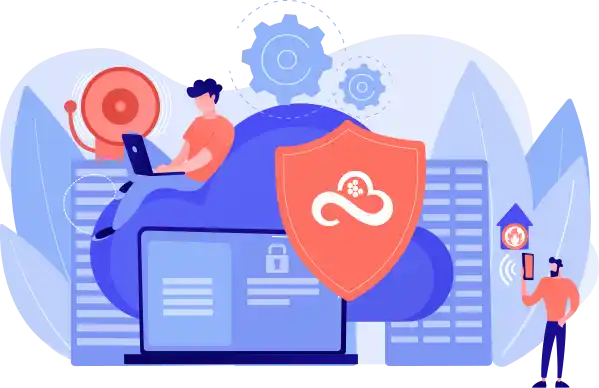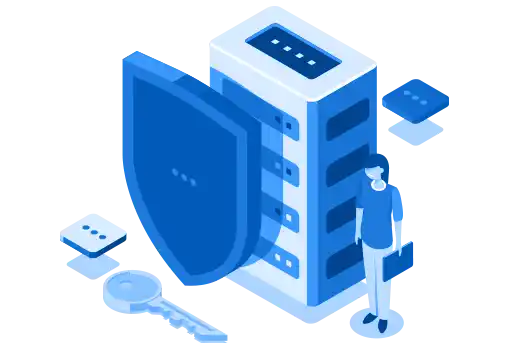 Server
Colocation
Server
Colocation
 CDN
Network
CDN
Network
 Linux Cloud
Hosting
Linux Cloud
Hosting
 VMware Public
Cloud
VMware Public
Cloud
 Multi-Cloud
Hosting
Multi-Cloud
Hosting
 Cloud
Server Hosting
Cloud
Server Hosting
 Kubernetes
Kubernetes
 API Gateway
API Gateway
Dont let any threat evade your security. We monitor your assets 24/7.

A safe system alone is not sufficient. To ensure that your cloud is fully hack-proof, monitoring is just as crucial. Monitoring systems ensure that threats that evade security are identified and eliminated before they could jeopardize the data and user privacy.
A team at Cyfuture constantly monitors the system and have an extensive list of stats delivered to them in real-time. Though it is very unlikely that our firewalls would ever be evaded but if it ever happens, our team will quickly spot the anomaly and also identify where the threat first entered. Within seconds, a command would send the threat to the chest and we’ll hard-erase it in a minute.

Cyfuture’s monitoring team comprises industry’s best cyber security experts that have a proven track record of maintaining high-end networks and have been directly responsible for the network security in highly-challenging roles.
We’re at our toes when it comes to security and monitoring and have a team of experts located on-site. Our advanced systems identify traffic pattern and also detect unusual behavior that deviates from the usual. We’ve the expertise and technology to stop the threat even before it enters your cloud server.
As part of the Cyfuture Cloud infrastructure audit service, every call to a supported Cyfuture Cloud public infrastructure public application programming interface (API) is logged as an event in the log. As of today, all Cyfuture Cloud services are supported by Cyfuture Cloud's infrastructure audit to log information.
This audit service logs all API calls that are made by the Oracle Cloud Infrastructure Console, Command Line Interface (CLI), Software Development Kits (SDK), custom clients that you have developed, as well as other services provided by Oracle Cloud Infrastructure. Among the information that can be found in the log files are:
Ttime of the API activityAs part of each log event, there will be a header ID, target resources, timestamp of the recorded event, request parameters, and response parameters. By using the Console, API, or the SDK for Java, it is possible to view events that have been logged by the Audit service. As a result of these events, you will have the ability to perform diagnostics and track resource usage, monitor compliance, and collect security-related data.
Cyfuture Cloud enables auditing, security monitoring, and operational troubleshooting by tracking user activity and API usage.
Cyfuture Cloud clients can track log events. Th details of the log event include a header ID, target resources, timestamp of the recorded event, request parameters, and response parameters. You can view events logged by the Audit service by using the Console, API, or the SDK for Java. Data from events can be used to perform diagnostics, track resource usage, monitor compliance, and collect security-related events.
When viewing events logged by audit, you might be interested in specific activities that happened in the tenancy or compartment and who was responsible for the activity. You will need to know that the approximate time and date something happened and the compartment in which it happened to display a list of log events that includes the activity in question. List log events by specifying a time range on the 24-hour clock in Greenwich Mean Time (GMT), calculating the offset for your local time zone, as appropriate. New activity is appended to the existing list, usually within 15 minutes of the API call, though processing time can vary.
When you navigate to audit in the console, a list of results is generated for the current compartment. Audit logs are organized by compartment, so if you are looking for a particular event, you must know which compartment the event occurred in. You can filter the list in all the following ways: Date and time, Request Action Types(operations), Keywords.
If you would like to export your audit logs in bulk, Cyfuture Cloud support will make copies of them within 5-10 business days, and they will be added to buckets in your tenancy within 5-10 business days. You will receive an export that will include logs for the specified regions, starting from the moment you make the request and continuing for a period of time thereafter.
If you have requested for a bulk export of audit logs, the export will include logs for the specified regions, beginning after you make the request and continuing into the future.
The administrator has total control over the buckets created for bulk export of audit logs and can grant access to others using IAM policy statements he or she has created.
If you have requested for a bulk export of audit logs, you will have access to these audit logs indefinitely (for a period of time that has no fixed end). However, you can disable your bulk export by contacting Cyfuture Cloud support. The bucket will no longer be updated with new logs, and audit logs will only be available through the Console, according to the retention period you have defined.
Once you raise a request for bulk export of audit logs, you have to specify all the regions you want to export in your request. It is important to note that if you only request certain regions, and later decide that you want to add other regions, you will have to submit a new request.
By continuing to use and navigate this website, you are agreeing to the use of cookies.
Find out more


